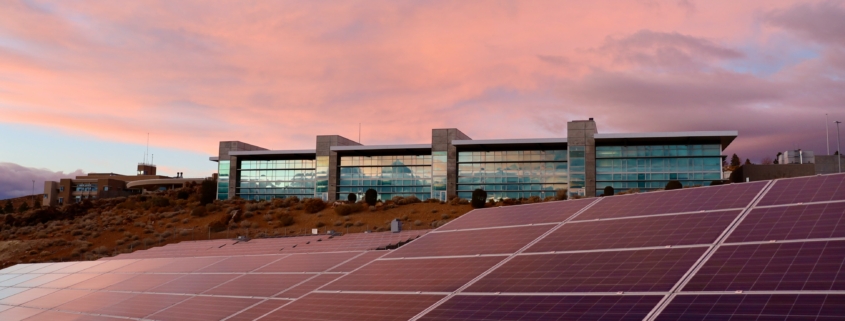Solar Panel Grants for Businesses
Quick Guide to: Solar Panel Grants for Business
Energy costs represent a large percentage of business overheads. Lighting and space heating account for around 76% of total energy use in warehouses and similar businesses. Finding ways to reduce these costs makes commercial sense. Renewable energy sources, in particular Solar PV, are growing in popularity – as businesses UK-wide move to this sustainable and cost effective energy source.
If you manage a business or own a commercial property, you may be wondering what support is available for you to switch your energy source. The good news is that as climate change drives businesses towards reducing their carbon footprints, more support has become available to incentivise the move to solar energy. Networks of CEOs and project managers are working together to prioritise assessing and reducing the carbon footprint of projects and initiatives. Furthermore, the laws passed by the UK government in 2019, pledging to cut greenhouse gas emissions to net zero by 2050, suggests that installing solar panels is a great way for businesses to; firstly improve their own capital but secondly, to also acknowledge their responsibility and role in the climate agenda. This quick guide to solar panel grants for business looks at what schemes are currently available for businesses to switch to solar.
The constant flow of opportunities
Following the Climate Change Act 2008, there has been a steady flow of energy grants for businesses. The fourth round of the Contracts for Difference scheme opened for applications in December 2021. The scheme’s funds are intended for low carbon technology in order to move the UK from volatile foreign fossil fuels. Alternatively, those registered with Solar Together can group-buy business solar panels, securing savings of 10-25% against the average market price. Shining the light back on central government sustenance, the Feed-In Tariffs Scheme that ran in 2018 and 2019 subsidised renewable electricity from small-scale low-carbon installations, such as solar panels. In contrast, some charities such as WRAP offer funds and energy grants for businesses. They are experts in their field and have a track record in awarding public money where it can make the greatest impact.
Low Carbon Workspaces Grant
The Low Carbon Workspaces Grant helps small and medium sized businesses reduce their carbon footprint. Low Carbon Workspaces is a not for profit organisation ran by Ngage Solutions which is a part of the BBF Group. A YouTube video on their energy grants for businesses, who is eligible, and how to apply, makes researching the process quick and easy. The programme has several project partners across England who help to share details of the grants for business scheme with the local community. The application process is straightforward, hassle-free and eligible businesses may receive the funds within 30 days.
Industrial Energy Transformation Fund
The UK Government’s most recent initiative that could provide access to a solar panel grant for businesses is the Industrial Energy Transformation Fund (IETF). In 2018, the government announced £315 million of funding which is available for nine years, up until 2027. It is currently in its second phase – which includes a competition. There have been successful applications during Autumn 2021, Spring 2022, and Summer 2022 applicants are being assessed. The fund champions solar panel installations, as its purpose is to develop and deploy technologies that enable businesses with high energy use to transition to a low carbon future; through implementing new innovations such as Solar PV for businesses. To add to this, Scottish businesses can apply for the Scottish Industrial Energy Transformation Fund, levelling up industrial energy efficiency across Great Britain. Anyone can apply, although corporations whose energy consumption is high will benefit most from this fund.
Access solar panels without grants
Whilst there are some solar panel grants available for businesses, it is worth making the move to Solar PV even if self-funding, due to the paybacks that producing your own energy delivers. Considering the current fluctuating energy prices, investing in Solar PV allows businesses to take control of future energy costs. Moreover, solar panels allow businesses to forward buy electricity, protecting yourself from further price rises. For those who are not eligible for any of the solar grants for businesses in this guide, looking elsewhere for financial support can make Solar PV for businesses more accessible. For example, the Royal Bank of Scotland has spotlighted the finance solutions it is providing, to help accelerate the transition to a low carbon economy. Subscription finance, asset backed and cash flow lending products may act as an alternative solution to seeking solar panel grants for businesses. Another bank offering support is NatWest whose ‘Green Loans’ enable eligible UK businesses to acquire assets in order to generate cleaner energy. The amount that businesses can borrow – with fixed and variable interest rates – ranges between £25,001 and £10,000,000. Similarly, HSBC’s Green SME Fund is available to those with a group annual turnover below £25,000,000. Businesses can get 1% cashback on the loan value, and can use the loan to invest in Solar PV, which sits within the renewable energy eligible green category.
On the other hand, solar panels can also be a source of revenue generation. In 2020, the UK Government published a notice of the Smart Export Guarantee, allowing solar panel owners to generate revenue by selling unused energy back to the National Grid.
Why Solar PV is worth it
Evidence has shown that the average business sees a return on investment four to six years after installation. During the current energy cost crisis, there is likely to be a much faster return. Solar panels help to reduce energy dependence and make businesses less reliant on the increasingly struggling National Grid. Solar panels for warehouses and manufacturing businesses are steadily becoming more popular. For units over 100,000 sq ft, by 2030, it is estimated that there will be 832m sq ft of roof space. The often heavy machinery and demands for temperature control that take place in these facilities, combined with the typical large roof spaces, make these building types some of the best to reap the benefits of business solar panels. Additionally, customers are educating themselves about companies’ carbon footprints in order to make informed purchases. By the same token, the rise of ESG (Environmental Social Governance) has meant that greener ways of operating have become embedded in business practices. Solar PV is a solid investment for your business’ finances and values.
There is a growing need for businesses to take control of their energy costs and responsibility for carbon reduction. Whatever reason you have for wanting to move to solar panels – there are a wide range of options even where solar grants for business are not available. To help determine if Solar PV could benefit your business, schedule a consultation with SQ4S by contacting us now. Additionally, if you are based in the North West, please see our energWISE scheme.




